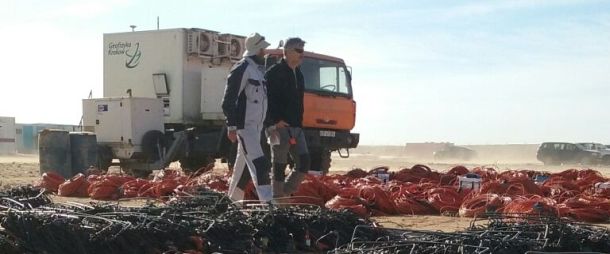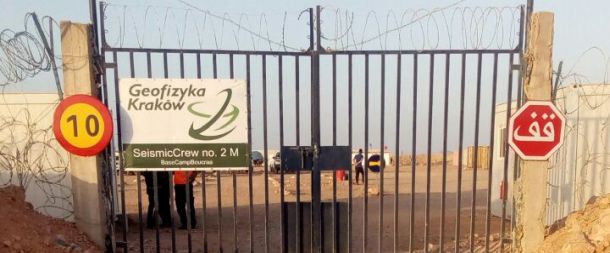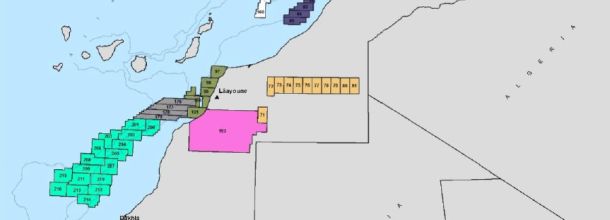Controversial Polish oil search stopped due to strike

When over 100 of the locally recruited staff stopped working, the Polish oil hunt in occupied Western Sahara had to temporarily close.
Published 22 June 2016
An intense labour dispute has erupted between a subsidiary of the Polish oil company PGNiG and its locally recruited staff in occupied Western Sahara. According to the Saharawi media network Equipe Media, the Polish operations came to a complete stop from 4 June. Equipe Media covered the labour dispute twice, on 10 June and 14 June.
The Polish firm is undertaking onshore seismic studies in Western Sahara on a contract by the Moroccan state owned company, and under protection by the Moroccan army - a type of operation which the UN has found to be in violation of international law. See further coverage on the controversy here.
There are, according to Equipe Media, two large categories of locally recruited staff, with different grievances.
First, it is the ground clearance personel, consisting of 50 workers, of whom 30 are Moroccan, the remaining Saharawis. Before seismic trucks can do its work by shooting its sound waves into the ground, this team of staff need to manually remove all rocks along the route. Then team of 50 have to place large sand bags and install geophones along the route. According to Equipe Media, this team was initially supposed to tidy and cover 3-4 kilometers daily. However, at one point, the Polish company is said to have demanded that the survey speed be increased to 9 kilometers a day, under the same work conditions, staff size and salary as before. From 26 May, these 50 Saharawis and Moroccans went on strike. Their salary is said to be around 235 Euros a month, working for 12 hours a day, 7 days a week.
Second, 51 persons have been contracted on a 3 months contract by a local company, mainly for driving. Also these 51 are said to have been working 12 hours a day, seven days a week. However, they are said not to have proper contracts. So they laid down their work on 30 May.
According to Equipe Media, the company and the workers did not reach an agreement, and on 4 June, police and armed forces came to the compound and expelled all of them. The drivers of the larger trucks, all allegedly Moroccans, were lodged in OCP’s quarters in Boucraa.
12 locally recruited staff who were not part of the strike, of whom 10 were kitchen personell, were also kicked out.
When Equipe Media covered the issue last, on 14 June, the operations had been halted since 26 May.
No state in the world recognise the Moroccan sovereignty claims over the territory. The Polish company has failed to seek the consent from representatives of the people of Western Sahara prior to the start-up. Its contract is with the Moroccan state company.
News
Polish company states 'political reasons' for departing Western Sahara
All workers of a Polish state owned company in occupied Western Sahara have just been pulled out from the territory 'because of political reasons'.
25 August 2016
The oil map is changing in occupied Western Sahara
Kosmos and Cairn have renewed their licence - but did San Leon Energy abandon one of its licences? A new map from ONHYM suggests changes to the highly controversial oil exploration in the occupied territory.
31 July 2016
WSRW demands Polish state oil company to leave Western Sahara
WSRW lauches today a report on the Polish oil company PGNiG, and demands it to abandon its project. WSRW asks its owners to intervene.
28 June 2016
Polish company undertakes seismic studies in occupied Western Sahara
The Polish seismic services company Geofizyka Kraków ignored warnings and started seismic studies for oil exploration in occupied territory.
09 June 2016


